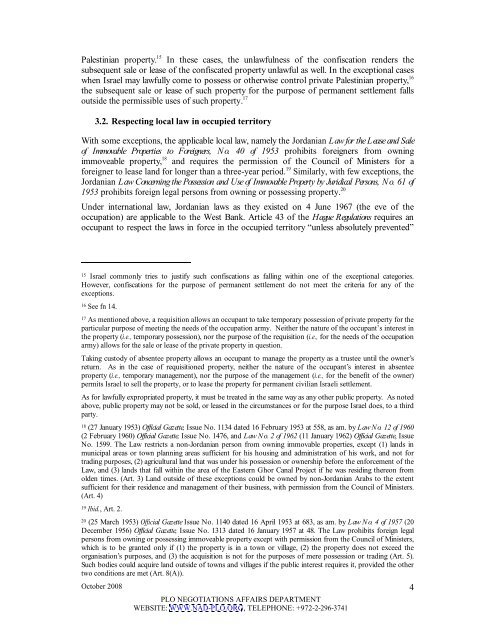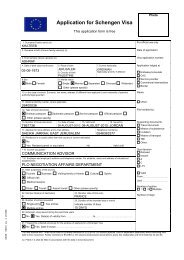NSU Memo Txns Pal property FINAL (Oct 2008). - Palestine ...
NSU Memo Txns Pal property FINAL (Oct 2008). - Palestine ...
NSU Memo Txns Pal property FINAL (Oct 2008). - Palestine ...
- No tags were found...
You also want an ePaper? Increase the reach of your titles
YUMPU automatically turns print PDFs into web optimized ePapers that Google loves.
<strong>Pal</strong>estinian <strong>property</strong>. 15 In these cases, the unlawfulness of the confiscation renders thesubsequent sale or lease of the confiscated <strong>property</strong> unlawful as well. In the exceptional caseswhen Israel may lawfully come to possess or otherwise control private <strong>Pal</strong>estinian <strong>property</strong>, 16the subsequent sale or lease of such <strong>property</strong> for the purpose of permanent settlement fallsoutside the permissible uses of such <strong>property</strong>. 173.2. Respecting local law in occupied territoryWith some exceptions, the applicable local law, namely the Jordanian Law for the Lease and Saleof Immovable Properties to Foreigners, No. 40 of 1953 prohibits foreigners from owningimmoveable <strong>property</strong>, 18 and requires the permission of the Council of Ministers for aforeigner to lease land for longer than a three-year period. 19 Similarly, with few exceptions, theJordanian Law Concerning the Possession and Use of Immovable Property by Juridical Persons, No. 61 of1953 prohibits foreign legal persons from owning or possessing <strong>property</strong>. 20Under international law, Jordanian laws as they existed on 4 June 1967 (the eve of theoccupation) are applicable to the West Bank. Article 43 of the Hague Regulations requires anoccupant to respect the laws in force in the occupied territory “unless absolutely prevented”15 Israel commonly tries to justify such confiscations as falling within one of the exceptional categories.However, confiscations for the purpose of permanent settlement do not meet the criteria for any of theexceptions.16 See fn 14.17 As mentioned above, a requisition allows an occupant to take temporary possession of private <strong>property</strong> for theparticular purpose of meeting the needs of the occupation army. Neither the nature of the occupant’s interest inthe <strong>property</strong> (i.e., temporary possession), nor the purpose of the requisition (i.e., for the needs of the occupationarmy) allows for the sale or lease of the private <strong>property</strong> in question.Taking custody of absentee <strong>property</strong> allows an occupant to manage the <strong>property</strong> as a trustee until the owner’sreturn. As in the case of requisitioned <strong>property</strong>, neither the nature of the occupant’s interest in absentee<strong>property</strong> (i.e., temporary management), nor the purpose of the management (i.e., for the benefit of the owner)permits Israel to sell the <strong>property</strong>, or to lease the <strong>property</strong> for permanent civilian Israeli settlement.As for lawfully expropriated <strong>property</strong>, it must be treated in the same way as any other public <strong>property</strong>. As notedabove, public <strong>property</strong> may not be sold, or leased in the circumstances or for the purpose Israel does, to a thirdparty.18 (27 January 1953) Official Gazette, Issue No. 1134 dated 16 February 1953 at 558, as am. by Law No. 12 of 1960(2 February 1960) Official Gazette, Issue No. 1476, and Law No. 2 of 1962 (11 January 1962) Official Gazette, IssueNo. 1599. The Law restricts a non-Jordanian person from owning immovable properties, except (1) lands inmunicipal areas or town planning areas sufficient for his housing and administration of his work, and not fortrading purposes, (2) agricultural land that was under his possession or ownership before the enforcement of theLaw, and (3) lands that fall within the area of the Eastern Ghor Canal Project if he was residing thereon fromolden times. (Art. 3) Land outside of these exceptions could be owned by non-Jordanian Arabs to the extentsufficient for their residence and management of their business, with permission from the Council of Ministers.(Art. 4)19 Ibid., Art. 2.20 (25 March 1953) Official Gazette Issue No. 1140 dated 16 April 1953 at 683, as am. by Law No. 4 of 1957 (20December 1956) Official Gazette, Issue No. 1313 dated 16 January 1957 at 48. The Law prohibits foreign legalpersons from owning or possessing immoveable <strong>property</strong> except with permission from the Council of Ministers,which is to be granted only if (1) the <strong>property</strong> is in a town or village, (2) the <strong>property</strong> does not exceed theorganisation’s purposes, and (3) the acquisition is not for the purposes of mere possession or trading (Art. 5).Such bodies could acquire land outside of towns and villages if the public interest requires it, provided the othertwo conditions are met (Art. 8(A)).<strong>Oct</strong>ober <strong>2008</strong>PLO NEGOTIATIONS AFFAIRS DEPARTMENTWEBSITE: WWW.NAD-PLO.ORG, TELEPHONE: +972-2-296-37414





